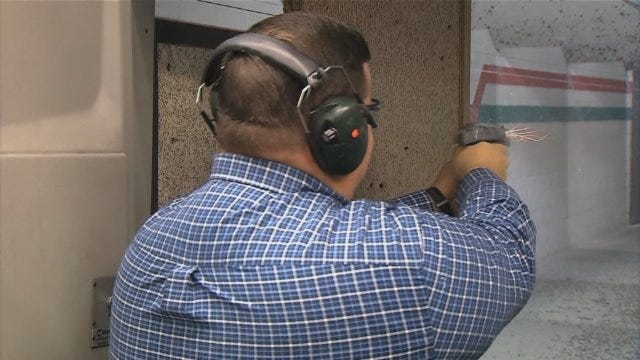Background Checks At OK Gun Shows? Some Say 'Yes'
Police know the majority of criminals get their guns on the black market, but they're increasingly paying attention to gun shows as places where criminals obtain guns.Thursday, June 20th 2013, 10:18 pm
Police know the majority of criminals get their guns on the black market, but they're increasingly paying attention to gun shows as places where criminals obtain guns.
A 9 Investigates hidden-camera investigation shows how easily someone with a criminal record or mental illness could buy guns at a gun show – no questions asked.
In all, the 9 Investigates team bought more than $4,500-worth of guns – three semi-automatic rifles, one semi-automatic pistol and one revolver. Four of the guns came from gun shows in Oklahoma City and Tulsa. The fifth came from the back of a truck at a metro-area flea market.
Sellers who sold guns to 9 Investigates emphasized the lack of documentation – often without prompting.
"There is no paperwork … so nobody knows who has what as far as weapons," one man, who sold the team a semi-automatic, AR-15-style rifle, said at an Oklahoma City gun show.
"It's a private collection, so you don't have to fill out paperwork," another seller explained before selling the team a .40-caliber pistol.
As soon as the team purchased the guns, they were turned over to a federally licensed firearms dealer, or FFL, to be sold to a properly vetted buyer.
All of the purchases were perfectly legal – for the team and the sellers. When buying a gun from an individual, as opposed to an FFL, the law requires only that the seller be satisfied that the buyer isn't a felon or mentally ill. But with no way to tell or verify, it's an unenforceable judgment call.
The U.S. Senate defeated a bill in April to close the so-called "gun show loophole." Under current law, buyers from FFLs must fill out background check forms and have their names cleared through multiple law enforcement databases. Buyers from individuals face no such restrictions.
The shooting of Officer Katie Lawson in August 2010 served as a warning. Her assailant used an AR-15 assault rifle that was purchased at a gun show.
Lawson's shooting was not an isolated incident.
A stack of reports for the last three years obtained from the Oklahoma City Police Department show that criminals try to buy guns at gun shows -- and police are watching. Nine Investigates identified 58 gun traffickers, gang members or career criminals who would have walked away with guns and ammunition had undercover officers not intervened.
Despite the number of arrests, Oklahoma City Police Chief Bill Citty believes many felons don't get caught. He blames this on the lack of background checks.
"It's not the cure-all for preventing violence, but it certainly is one piece of that that we think will be beneficial," he said. "One felon that gets out of the gun show with a firearm is one too many."
Tulsa attorney Mark Lyons, an FFL and former prosecutor who has represented clients in gun-rights cases, disagrees with the potential effectiveness of expanded background checks.
"I just don't believe that increasing the number of background checks is going to markedly reduce the number of crimes committed with guns," he said, noting that prohibited buyers still would have ways to obtain guns. Lyons takes issue with the phrase "gun-show loophole." In his experience, gun shows don't differ from other places a person could buy a gun.
"You name it, you can buy guns virtually anywhere, so the idea that there is this unique gun show loophole is a serious misnomer as far as I'm concerned," he said.
Lyons noted that high-profile shootings in recent years involved legally acquired firearms.
"Following through with the gun laws the way they are now did absolutely nothing to prevent those acts," he said.
The FBI conducted 367,000 gun-related background checks in Oklahoma in 2012.
According to the Law Center to Prevent Gun Violence, four states strengthened background-check laws in the wake of the Newton, Conn., shootings. Nine states currently have some form of universal background check.
Data from the Bureau of Alcohol, Tobacco and Firearms, or ATF, show that more than 10,000 thousand guns used in crimes each year are connected to gun shows.
"It does happen," Second Amendment advocate Tim Gillespie said, "but most of the time criminals get their guns through nefarious means."
To Gillespie, who heads the Oklahoma Second Amendment Association, expanded background checks aren't the answer.
"We think it's punishing the honest person for the sins of the criminal. We need to make it easier for law-abiding citizens to be able to get a gun and defend themselves," he said.
"We have an inalienable right to be able to defend ourselves, and for the government to infringe on that is a serious matter," he said.
Parker is a former Oklahoma City gang member who has turned his life around. Because he spent years in prison, he can't pass a background check to legally purchase a gun. He doesn't try, but others in his position do.
"They're accessible. It's very easy," he said of gang members obtaining guns. "We didn't have this … access to guns like they do nowadays. We didn't have that type of access to them," he said.
Parker worries about his daughter's safety and would like to see gun-buying rules revamped.
"We need to consider the innocents. We have to consider the lives lost," he said.
More Like This
June 20th, 2013
November 13th, 2024
October 28th, 2024
October 17th, 2024
Top Headlines
January 7th, 2025
January 7th, 2025
January 7th, 2025












